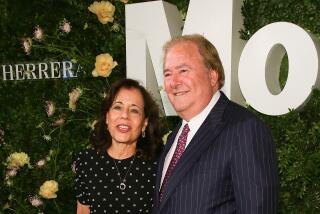Meet the Richest Man in L.A.
- Share via
Who the hell is Gary Winnick?
Among many other things, he is the newly crowned richest man, woman or child in Los Angeles. Winnick, a 51-year-old investor and former partner of Michael Milken, tops this year’s edition of a local business publication’s list of the richest people in L.A.
How rich is he?
In the last two weeks he has lost a billion dollars. And he’s still the richest man in a town full of rich people.
He’s so rich that his longtime housekeeper, to whom he gave stock in a company he was starting, is now a millionaire herself; she’s about to get a housekeeper of her own.
The company is Global Crossing, which Winnick founded just two years ago.
The Los Angeles Business Journal estimates Winnick’s net worth at $6.2 billion, well ahead of Marvin Davis, the oil and entertainment industry executive who is No. 2 on the list.
Global Crossing had a relatively simple business plan: raise $750 million to buy a fiber-optic cable business from AT&T; and lay a cable beneath the Atlantic Ocean.
Winnick had spent the previous 25 years in the investment banking business and was able to find enough financing, including $15 million of his own, to do the AT&T; deal.
He was able to raise that amount of money in a relatively short time in large part because of his own belief in the opportunity.
“He’s a fantastic salesman,” said Lod Cook, former Arco chairman who joined Global Crossing as co-chairman shortly after its founding.
What Winnick was selling with Global Crossing was a belief that the telecommunications industry was about to explode with opportunity. He had done deals in the industry for two decades and was persuaded that deregulating markets and technological advances were about to revolutionize the business.
“All points of the world are now being touched by it and it’s contagious. And let me tell you something, once it starts, it won’t stop,” he said.
It was a good call. Within two years, Global Crossing’s stock was valued at more than $20 billion. Two weeks ago, it announced it would buy U.S. West, a century-old company with more than 50,000 employees. Such an occurrence would have been unthinkable 20 years ago. Now, in a marker of how the financial and technological worlds have changed utterly, it seems almost commonplace.
Winnick, for one, isn’t surprised.
“The world was exploding. All the currents were flowing in the right direction and we were right there in the epicenter,” he said. “That’s what we do for a living: Seize the moment. . . . To me, it’s not a very complicated process.”
Most of Winnick’s wealth consists of Global Crossing stock, the movement of which accounts for the billion-dollar paper loss in the last two weeks.
It still leaves him with plenty. He’s not alone, either. Everybody who works at Global Crossing owns stock.
“God bless America and God bless Gary Winnick,” Cook says. “We have secretaries here who are multimillionaires.” That Winnick is generally unknown is not accidental, says Mike Sitrick, a longtime friend.
“He always been below the radar. That’s the way he wants things. He’s a very private guy,” Sitrick said.
Winnick and his wife of 26 years live in West Los Angeles. They have three sons, who Winnick says beat him up on the basketball court.
Winnick grew up on Long Island in New York. One grandfather sold restaurant supplies--plates and silverware--out of a pushcart on the Bowery. Another had a factory that did garment piece work. His father was in restaurant supply, and Winnick says it never occurred to him not to go into business.
He worked at grocery stores, the Howard Johnson, and as a golf-course caddy as a kid.
After college he went to work selling furniture and eventually to the brokerage firm Drexel Burnham Lambert, where he met Milken. When Milken moved the firm’s high-yield bond group to Beverly Hills, Winnick followed. One of his specialties at Drexel became telecommunications. He arranged the first investments in MCI.
He says now he had a flash of insight in which he recognized even then how the telecommunications industry would change. “I remember driving with my dad through the midtown tunnel and being fascinated that people were paying to get through it. I thought, ‘Boy, that’d be a great business, getting a piece of all that traffic.’ ”
This is, of course, what the telecommunications business is all about--getting a piece of the traffic.
More to Read
Inside the business of entertainment
The Wide Shot brings you news, analysis and insights on everything from streaming wars to production — and what it all means for the future.
You may occasionally receive promotional content from the Los Angeles Times.










